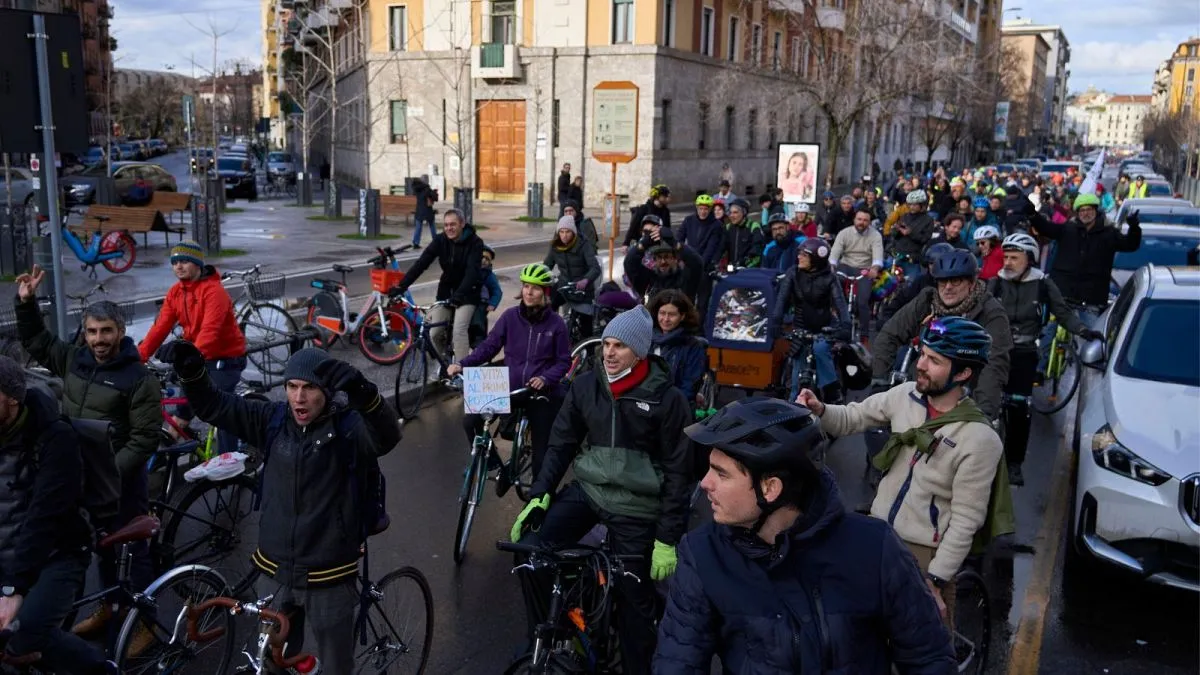Matteo Salvini, leader of the far-right Lega party and transport minister has proposed a reform of the traffic road code.
The reform is focused on increasing penality for the types of collisions that have a large echo in the media, such as when the person responsible was under the influence of alcohol or drugs, but in reality it risks increasing the main factor in road mortalities: speed.
In fact the reform will limit mayors’ ability to create new cycle routes or car-free ‘school streets’, or to keep polluting cars out of city centres. It also restrict the possibilities to deploy speed traps.
Campaigners held demonstrations in dozens of Italian cities last week, calling for the reform to be scrapped and re-written in consultation with bereaved families.
cross-posted from: https://feddit.it/post/7041224



The problem with your comment is that you have a lot of opinions, and they all may sound reasonable, but the facts and data give away a different story, and it is hard and takes time to demonstrate that most of what you state is, to say it kindly , false
So I’ll take only one of your statements and answer that, and won’t waste more time for the rest.
Theory:
So, based on the data above, how can speed not be a main factor, especially if we are talking about road fatalities?
So to support theory with fact, there is ton of data on cities that lowered speed limit from 50 to 30 km/h. And data consistently shows reduction in crashes, injuries and fatalities.
I’m not wasting time describing each of the articles below:
Yes. The “Cyclists don’t use cycle lanes” line also comes right from the angry right list of grievances. If there’s a cycle lane and people aren’t using it, it’s self-evidently not good enough. And this is hardly surprising when most cycle lanes are cheap afterthoughts that increase danger and inconvenience
Yes, sometimes this is true. Sometime it is a cold observation of the facts.
Again, sometimes this is true. I agree with you about the new “cycle lanes” done in Milano where basically they just painted some lines on the roads and hope they were respected (btw forgetting anything about where they put them). Sometimes even a convenient physically separated cycle lane is left unused just because.
And the problem with your answer is that you get the only thing I openly say it is an opinion (based on my experience anyway) to dismiss all the other points like an opinion where instead I offered some observed facts
Practice:
Obviously if you reduce speed you reduce the possibillity of a fatality. Following this way of thinking, if you reduce the speed to 10 Km/h you reduce even more the crashes and fatalities. Even better, remove the cars, 0 crashes (not sure about 0 fatalities btw).
So, maybe, instead of making new rules, why we cannot start to think to enforce the ones that already exist, on all the users of a road ? After all the Italian road laws are written with the idea that if you follow them then there should not be problems (if not in out of control situations like a failure or similar things).
So my point, in the end, is that concentrating only on the speed, again in my opinion, we are just looking at the most easily factor to “punish” just becasue we are taking for granted that it is always the car the guilty side, in part because all the data normally say “a pedestrian was hit by a car going to 60 Km/h” or “a cyclist was crushed by a lorry turnig right” but they don’t say that the pedestrian was trying to cross a road there the limit is 70 Km/h outside the crosswalk or traffic light and that the cyclist was trying to overtake on the right the turning lorry.
Then it is true that there are some criminals that drive way too fast for place and situation and they are objectively a danger to everyone and everything around them, but I suppose that we cannot continually make new rules following the expectional case and not the norm.
What you reported are anecdotal facts. Things you observed. Objective facts and data are what we need to improve. The fact that you see people not using the bike lane is not relevant.
Did you check these?
The 3 points you mention as practice are not practice at all. They are theory, they are laws that are usually not respected.
30 km/h is only the maximum speed allowed. And it is a compromise that wold allow for a huge reduction of crash damage, while not reducing travel time by much. Because the average speed in cities is, let’s remember that, more in the 10-20 km/h range. So, speeding between red lights does not save anyone’s time, just increase the danger.
Don’t make me look up for articles about that (please, do it yourself, there is plenty), but the increase of travel times when maximum allowed speed is decreased from 50 to 30 is very low (much, much lower than 50/30 ratio), and the benefits in terms of danger is so high, that it is totally worth it. So the argument “let’s make it 10 km/h” doesn’t make any sense
it’s not a question of who is guilty, it is a question of where the danger comes from. And it doesn’t come from pedestrians or cyclicsts (see my previous post), it comes from cars. Stop signs exist because of cars. Traffic light exist because of cars. Car insurance exist because of cars.
No, nobody wants to punish. It is because of facts (not anecdotes). It is because it works in theory and in practice, as I fully documented in my previous post. And I was only taking into consideration the 50 to 30 km/h reduction. It works in all the cases, even highways https://www.ncbi.nlm.nih.gov/pmc/articles/PMC2598360/
No. In my town we had people paid to do it. Both normal people and police officers. So, with your permission, I would take it for true unless you can prove me wrong. Then I can concede that there could be some inaccuracy in the count, but I don’t really think that it could be more than some rounding error.
Then this someone is not paying attention to his surrounding and it is in the wrong, whatever vehicle he is driving. You don’t dismiss a cyclist only because he is on a bike path and you are not, because you never know what could happen to him, even just a hole in the lane or a mechanical problem, so you need to constantly keep an eye on him until you overtake him. Sorry if I know what I am doing while driving.
Nope, physically separated bike path. They are on the side of the road but there is a small curb between the car lane and the bike lane.
And when I drive a car I always respect the laws, so what is the point ? That we both respect the rules ?
Then enforce them. The laws are already here. No need for new laws that you cannot/don’t want enforce. Because we all (as Italians) know that they will not be enforced.
I would agree with you if we take this approach and applied it considering the situation street by street (the town know how main crash and fatalities happen in each of them, if a crash is not reported then there is not a fatality and no harm), not if we blindly apply it for political reasons, on both sides. I concede that there could be some initially unreported accident, but in the end if an accident cause a fatality (or harm in any way) it would be reported.
Following your logic, if I sucker punch you and I break my hand, you are the danger. No, I don’t buy it.
If you as a pedestrian or a cyclist keep a dangerous behavior on the road (crossing where you should not, taking over when you should not and so on) then you are the danger, not the car. I don’t accept the fact that if I am driving my car following the laws then you as a pedestrian can do whatever you want, even dangerous thing, and I am the danger and must pay for your idiocy. I am fine to be held accountable for what I am doing on the road but not for what you are doing.
True, and it is being expected to be respected from every user of the road, not only the cars. Please explain to me why if you as a pedestrian cross an intersection while having the red light then the car that hit you (or not) is the danger. Just because the car is bigger ?